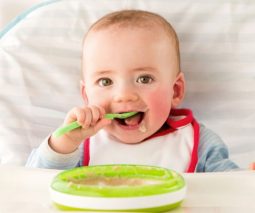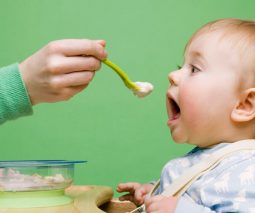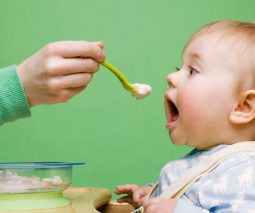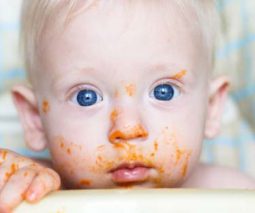A no-nonsense guide to growing a happy, healthy vegetarian baby

Vegetarian kids have unique nutritional requirements when it comes to healthy eating. Here’s how to ensure their needs are (deliciously) met and their tummies are full.
Is a vegetarian diet recommended, though?
The American Dietetic Association (ADA) last year released a paper stating that a vegetarian diet can set kids up for lifelong healthy eating patterns and is a healthy option for anyone, if approached mindfully.
“Well-planned vegetarian diets are appropriate for individuals during all stages of the life cycle, including pregnancy, lactation, infancy, childhood, and adolescence, and for athletes,” the ADA says.
The ‘well-planned’ part of the ADA statement is key.
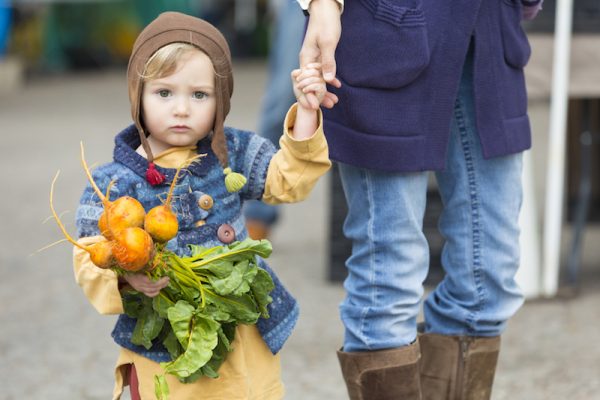
What exactly is a vegetarian diet?
Vegetarian diets come in various shapes and sizes. Here’s the top four, in case you need a refresher:
- Lacto-ovo vegetarian – meat-free but include eggs, milk, and dairy products in the diet.
- Lacto-vegetarian – meat-free and egg-free but include milk and dairy foods in the diet.
- Ovo-vegetarian – meat-free, dairy-free but includes eggs in the diet.
- Vegan – free of all animal products. Strict vegan diets for children should be approached vigilantly and supported by advice from an appropriately qualified health professional.
The meat-free descriptor includes: meat, poultry, game, fish and shellfish.

The Dietitians Association of Australia (DAA) says that children’s differing nutritional needs make it essential to seek expert advice if you’re planning on raising your little one as a vegetarian.
Rather than following the latest ‘crunchy mum’ on Instagram, the DAA sensibly suggests working with an Accredited Practising Dietitian (APD) to ensure optimal nutrition and wellbeing for you child.
How can I get the balance right?
Breastmilk and baby formula are helpfully packed with their own excellent supply of nutrients. This makes breastfeeding or formula feeding for as long as possible a good idea for vegetarian babies.
This doesn’t mean you should delay the introduction of solids for vegetarian babies, though, experts say.
Once your child does move on to solid foods, you should work towards including the following nutrients on a daily basis:
- Protein: for growing healthy kids – aim for 2 to 3 serves a day from sources such as eggs, dairy products, nut butters, soy products, legumes (baked beans, lentils), tempeh and tofu.
- Energy: a high fibre vegetarian diet can mean getting enough energy each day can be a challenge. Boost your kids’ energy with dairy products, eggs, tofu, tempeh, calcium-fortified drinks, avocado, nut butter, healthy oils, seed pastes, whole grains and meat substitutes.
- Iron: for brain and blood health, immunity and energy – it’s found in legumes (baked beans, lentils), wholegrain foods, iron-fortified cereals and drinks, green leafy vegetables, dried fruits, nut butter, seed pastes, eggs.
- Vitamin B12: for healthy brain, blood, metabolism and nervous system – find it in dairy products and eggs.
- Zinc: for immunity and energy – find it in legumes, wholegrain breads, wholegrain cereals, nut butters and seed pastes.
- Calcium: for strong bones and teeth – find it in milk, cheese, yogurt, calcium-fortified drinks, nut butters and some green vegetables. Vitamin D supports calcium absorption, so be sure your littlie is getting enough Vitamin D, too.
- Healthy fats: from non-meat sources – avocado, nut milks, nut butters, dairy products, soy products, fat spreads and healthy oils.
- Fibre: Fibre is essential but fills babies up quickly, meaning they may not get enough energy for optimal health. To counteract this, it’s important to feed babies often and provide plenty of healthy, high energy snacks. Great sources of fibre include wholegrain breads and cereals, leafy greens, root veggies, fruit, legumes and almonds.
It’s all sensible stuff, but you can see that it makes sense to seek out expert support to get the balance right for your child.

Clever combo vegetarian meals
Kids have little tummies, so feed them well and feed them often!
Some foods work best when complimented by other foods, ensuring vitamins and minerals are properly absorbed. This is important to note when considering any child’s diet, but especially important in vegetarian children who have more of a challenge when it comes to packing nutrients in.
Remember…
- High energy foods are a must to fuel little bodies. Try to balance important fibre with high energy foods to ensure that iron, zinc and calcium are absorbed properly (too much fibre halts the absorption of these important nutrients.) High energy foods include dairy products, eggs, tofu, tempeh, calcium fortified drinks, avocado, nut butters, healthy oils, seeds, whole grains and meat substitutes.
- Important but low energy vegetarian foods like vegetables should be combined with higher fat healthy foods like avocado, veggie fritters or wholegrain bread with nut butter or ricotta cheese.
- Combine foods that are high in Vitamin C with high iron foods to enhance iron absorption. You might offer an orange (Vitamin C!) after your child’s breakfast baked bean toastie (iron!), for instance.
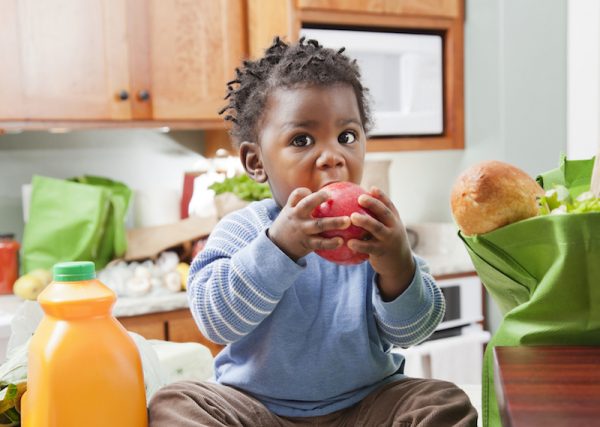
A day in the life of a vegetarian toddler
Here’s a sample meal plan which incorporates all the above recommendations. Sydney Children’s Hospital has more meal planning ideas for your little vegetarian.
Breakfast
Toast with baked beans and an orange
Morning tea
A tub of yogurt (or soy yogurt)
Lunch
Wholemeal sandwich with avocado AND
bowl of salad veggies and cheese cubes
Afternoon tea
Wholemeal crackers with nut butter
Dinner
Dhal with rice and broccoli fritters (and a blob of yogurt!)
Dessert
A tub of yogurt (or soy yogurt)
Supper
Soy milk or whole milk with Milo
Drinks
Water
Milk – up to 500 to 600 ml per day

Your happy vegetarian baby shopping list
Here’s a few ideas to get you started:
Eggs, dairy products (milk, cheese, yogurt etc), calcium and/or iron-fortified drinks, nut butters, soy products, legumes (baked beans, chickpeas, lentils, etc), tempeh, tofu, hommus, tahini, fruits, vegetables (especially avocados, leafy and root), wholegrain products (pasta, bread, crackers), healthy oils, meat substitute products, iron-fortified breakfast cereals.
Top tips for happy vegetarian babies
- Feed well and feed often
- Opt for unprocessed, unrefined foods where possible.
- Keep nutrient balance in mind by cleverly combining foods.
- Offer your child a wide range of foods.
- Seek advice from an accredited dietitian.
- Plan meals and shop for nutritional success.
- If you’re a vegetarian, and you’re breastfeeding your vegetarian baby, ensure you are maintaining a healthy diet and nutrient balance too.



